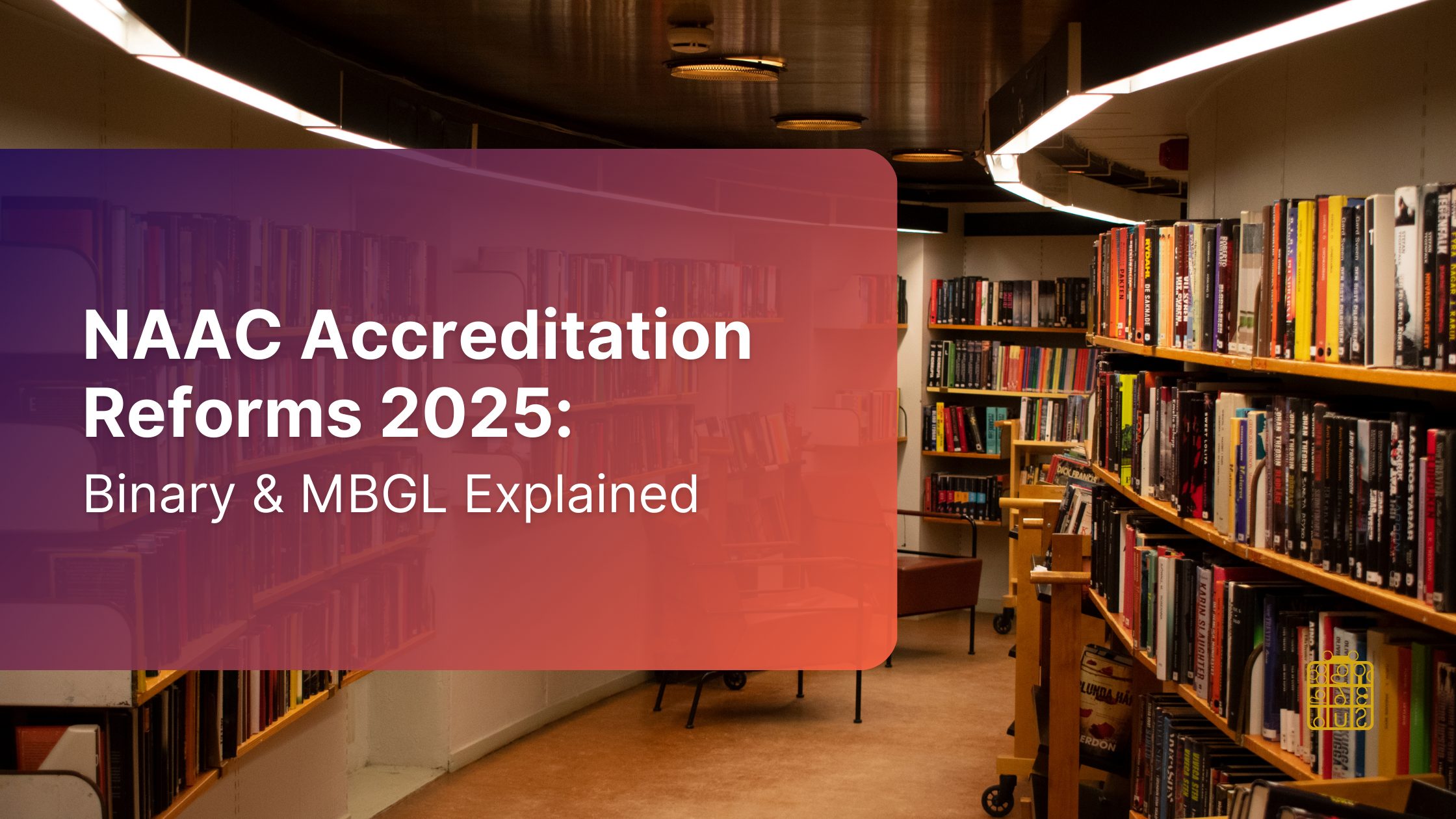NAAC Accreditation Reforms 2025: Binary & MBGL Explained
By, Kramah Author
Understand NAAC Accreditation Reforms 2025: Binary Accreditation, MBGL, and transitional provisions for HEIs under RAF. Prepare your institution for India's evolving quality assessment. Get updated and stay compliant.

What if accreditation wasn’t just a grading ritual but a roadmap to excellence? The NAAC Accreditation 2025 reforms in India; Binary Accreditation and Maturity‑Based Graded Levels (MBGL) are here to transform quality assurance. India’s higher education is set for a major overhaul with the NAAC Accreditation Reforms 2025, based on the Dr. Radhakrishnan Committee’s recommendations.
These reforms aim for a more flexible and efficient quality assessment for Higher Education Institutions (HEIs).
Feeling anxious or excited? You should be. Institutions must respond proactively to stay relevant and competitive.
What’s New In NAAC Accreditation Reform 2025?
The core of the NAAC 2025 reforms lies in establishing a more logical and phased accreditation process.
- Launch of Basic (Binary) Accreditation (April–May 2025): This will serve as the foundational level of accreditation.
- Introduction of Maturity-Based Graded Levels (MBGL): Following successful Binary Accreditation, institutions can opt for a more in-depth assessment through MBGL.
What Is Basic (Binary) Accreditation?
Binary Accreditation offers a clear “Accredited” or “Not Accredited” outcome. By April–May 2025 launch, most HEIs will first clear this foundational compliance check.
Pros vs Cons:
• Pros: Quick to achieve, transparent, inclusive
• Cons: No differentiation of quality levels.
What Is Maturity Based Graded Levels(MBGL)?
MBGL is a multi‑tiered system (Levels 1–5), assessing maturity across governance, teaching, research, and infrastructure. Institutions move upward as they flourish.
The Maturity-Based Graded Level (MBGL) model introduced by NAAC has five levels. These levels show how developed an institution is, moving from the minimum standards to international excellence:
- Level 1 – Basic: Meets minimum requirements.
- Level 2 – Developing: Shows progress and improvement.
- Level 3 – Established: Stable systems with consistent results.
- Level 4 – Advanced: Strong innovation and national leadership.
- Level 5 – Global Excellence: Performs at international standards with worldwide recognition.
This scale helps colleges demonstrate their growth and long-term development beyond just being “Accredited.”
Learn more about Maturity Based Graded Level(MBGL) in Detail here
Checklist before MBGL application:
• Passed Binary Accreditation
• Digitized SSR and data dashboards
• IQAC strengthened
• Governance policies in place
Transitional Rules for RAF Institutions
Institutions mid-cycle in the current RAF (Cycle 2 or higher):
• Retain existing NAAC grade until MBGL rolls out
• Can later opt for Basic or MBGL accreditation
• Fees paid under RAF are adjusted fairly based on assessment stage.
Preparation Roadmap for your Institution:
Preparation steps:
- Readiness Audit: Evaluate current compliance, data systems, IQAC setup.
- Governance & Documentation: Digitize internal records, refine policies.
- Accreditation Software: Adopt automation (e.g., accreditation‑management tools).
- Mock Audit & Training: Conduct internal drills and faculty training.
- Peer Mentoring: Partner with institutions already accredited for guidance.
“Institutions that digitize and align governance upfront will navigate these reforms faster and with better outcomes,” says Dr. Rama Venugopal, a higher‑ed accreditation consultant.
Conclusion: NAAC Accreditation Reforms 2025
👉 Ready to simplify your NAAC journey?
Explore how Kramah’s KI-NAAC Software can help your institution achieve accreditation faster, with less stress and more accuracy.
[Book a Free Demo with Kramah Software Today]
FAQ's:
(Frequently Asked Questions)
What is the focus of NAAC Accreditation Reforms 2025?
The primary focus is to streamline and enhance the accreditation process by introducing a two-tiered system: a foundational Binary Accreditation and a more advanced Maturity-Based Graded Levels (MBGL). This aims to improve institutional quality assessment and encourage broader participation.
Who is the Binary Accreditation system best suited for?
Binary Accreditation is ideal for institutions that are new to the accreditation process or are in the early stages of their development. It provides a straightforward path to achieving a baseline level of quality recognition.
How many maturity levels are there in the MBGL model introduced by NAAC?
NAAC’s MBGL model has five levels(From Level 1 to Level 5): Basic, Developing, Established, Advanced, and Global Excellence. These levels show how mature an institution is beyond accreditation.
What does MBGL (Maturity-Based Graded Levels) involve?
MBGL is a more in-depth assessment for institutions that have already achieved Binary Accreditation. It evaluates an institution’s maturity in areas like educational quality, governance, and continuous improvement, assigning a graded level to reflect its standing and progress.
What will happen to the fees paid by institutions under the old RAF system?
NAAC will adjust the fees for institutions that have already paid under the Revised Accreditation Framework (RAF). The adjustment will be based on how far the institution has progressed in the assessment process, ensuring fairness.
When are the NAAC Accreditation 2025 reforms expected to be implemented?
The Binary Accreditation model is expected to be rolled out in April–May 2025, with the MBGL system following shortly thereafter.
